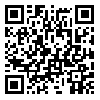دوره 8، شماره 3 - ( بهار 1402 )
جلد 8 شماره 3 صفحات 166-157 |
برگشت به فهرست نسخه ها
Download citation:
BibTeX | RIS | EndNote | Medlars | ProCite | Reference Manager | RefWorks
Send citation to:



BibTeX | RIS | EndNote | Medlars | ProCite | Reference Manager | RefWorks
Send citation to:
Habibisaravi R, Ghasemihamedani F, Oveis G, Azizi S, Assadi T. Assessing Job Burnout Status in Front-line Healthcare Providers at Mazandaran University of Medical Sciences During the COVID-19 Epidemic in 2022. Health in Emergencies and Disasters Quarterly 2023; 8 (3) :157-166
URL: http://hdq.uswr.ac.ir/article-1-446-fa.html
URL: http://hdq.uswr.ac.ir/article-1-446-fa.html
Assessing Job Burnout Status in Front-line Healthcare Providers at Mazandaran University of Medical Sciences During the COVID-19 Epidemic in 2022. فصلنامه سلامت در حوادث و بلایا. 1402; 8 (3) :157-166
چکیده: (2983 مشاهده)
Background: The COVID-19 epidemic was a biological disaster that may cause or exacerbate burnout in healthcare professionals (HCPs). Our goal was to determine the impact of the long-term COVID-19 epidemic on burnout in front-line healthcare workers and the factors affecting it.
Materials and Methods: This cross-sectional survey on front-line HCPs’ job burnout based on an online platform was conducted at Mazandaran University of Medical Sciences. The demographic characteristics, medical-work-related factors, and COVID-19 exposure were collected by the self-reported Farsi version of the Maslach burnout inventory questionnaire.
Results: Out of 2100 sent questionnaires, 924 participants completed them (44% response rate) of which 280 were male (30.3%). Overall, 850(92%) respondents had a high level of emotional exhaustion, 872(94.4%) had a high level of depersonalization, and 112(12.1%) had a high reduced personal accomplishment. There was a significant relation between higher burnout levels with higher education levels, working in hospitals as clinical staff, and pre-hospital operational personnel as well as having direct contact with a significant number of COVID-19 Patients. A significant number of participants (94.2%) were in severe and moderate burnout levels.
Conclusion: There was a significant increase in job burnout among front-line HCPs during the COVID-19 epidemic compared to former similar studies at the beginning of the epidemic and non-epidemic periods. It is recommended that in disaster management planning, especially in long-standing ones like COVID-19, the proper programs should be considered for increasing the resilience of HCPs.
Materials and Methods: This cross-sectional survey on front-line HCPs’ job burnout based on an online platform was conducted at Mazandaran University of Medical Sciences. The demographic characteristics, medical-work-related factors, and COVID-19 exposure were collected by the self-reported Farsi version of the Maslach burnout inventory questionnaire.
Results: Out of 2100 sent questionnaires, 924 participants completed them (44% response rate) of which 280 were male (30.3%). Overall, 850(92%) respondents had a high level of emotional exhaustion, 872(94.4%) had a high level of depersonalization, and 112(12.1%) had a high reduced personal accomplishment. There was a significant relation between higher burnout levels with higher education levels, working in hospitals as clinical staff, and pre-hospital operational personnel as well as having direct contact with a significant number of COVID-19 Patients. A significant number of participants (94.2%) were in severe and moderate burnout levels.
Conclusion: There was a significant increase in job burnout among front-line HCPs during the COVID-19 epidemic compared to former similar studies at the beginning of the epidemic and non-epidemic periods. It is recommended that in disaster management planning, especially in long-standing ones like COVID-19, the proper programs should be considered for increasing the resilience of HCPs.
| بازنشر اطلاعات | |
 |
این مقاله تحت شرایط Creative Commons Attribution-NonCommercial 4.0 International License قابل بازنشر است. |





